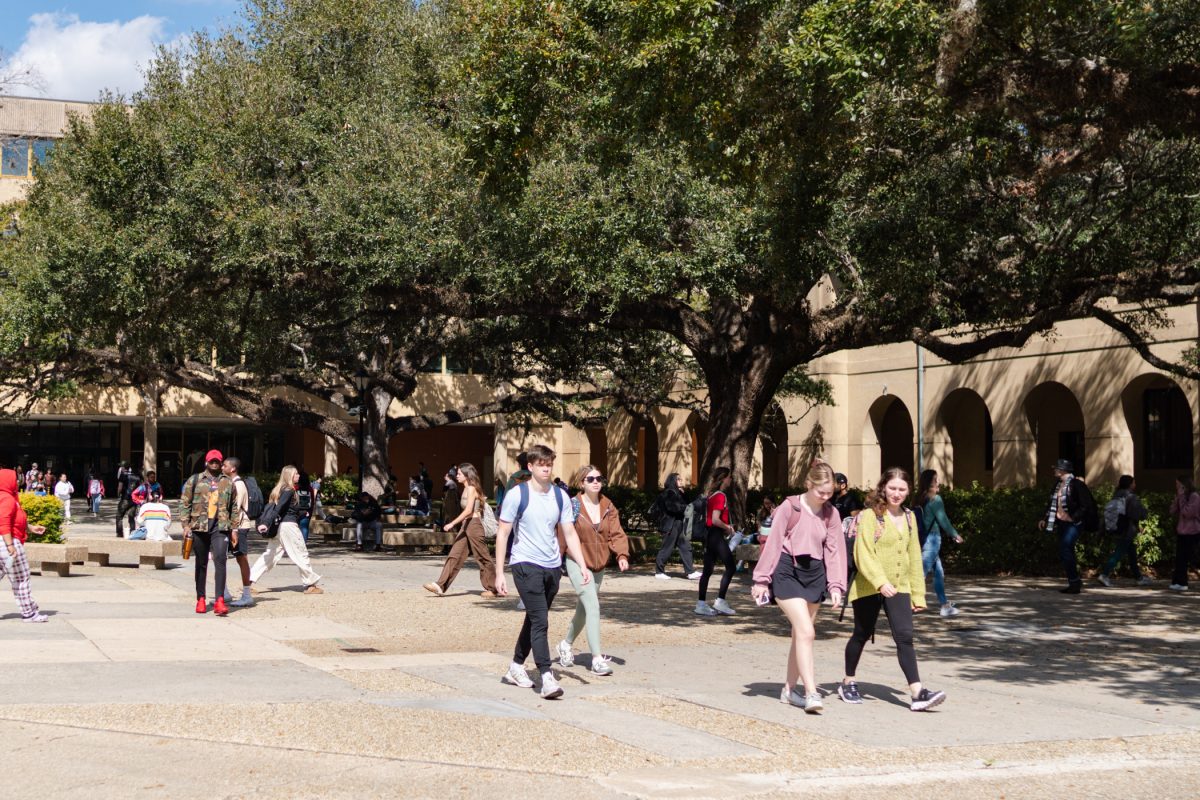The Reveille asked LSU students from across several organizations, majors and years whether they feel represented on a campus of over 30,000, in hopes of understanding student sentiment surrounding inclusivity.
Members of Greek organizations and groups like the Asian and Black Student Unions explain they feel underrepresented at LSU, which has impacted their college experience.
“I don’t have a professor who necessarily looks like me,” said Bailey Walker, a senior studying sports administration and a member of Delta Sigma Theta Sorority. “So that does make a difference. I’m looked at differently by being one of the only Black women, or a Black student in my classroom altogether.”
Savannah Moore, a sophomore industrial engineering major, had a different opinion when asked if she felt represented.
“I feel like there’s a lot of different clubs and opportunities for different backgrounds to join and to connect and so overall for me, I never felt out of place being here,” Moore said.
Moore is a member of the Alpha Kappa Alpha Sorority, one of the prominent NPHC Greek organizations on campus. Junior Chandler Collins, studying apparel design, serves as AKA’s vice president.
“I think my organization, specifically my chapter and NPHC in general, does a great job of representing the Black community,” Collins said. “I think that through us, we have a lot of representation in a lot of different types of rooms: Student Government and different types of orgs all over campus. So I do think we as a Divine Nine do a great job of representing the community.”
The Multicultural Greek Council, the newest Greek council on LSU’s campus, was created to give more representation to different communities within LSU. Junior Britney Tobar, studying psychology and French on the pre-med track, is a founding member and vice president of Eta Iota, LSU’s chapter of Lambda Theta Alpha Latin Sorority.
“I actually transferred here from West Texas A&M University and it was a big culture shock,” Tobar said. “In Louisiana, there are not a lot of Hispanics or a lot of Hispanic stores, so it was kind of weird for me because I was like ‘Oh, where do I get my groceries?’ I didn’t know anybody to ask either.”
Tobar is also the vice president of the Latin American Student Organization on campus, which she joined after only a few weeks of being at LSU. LASO is dedicated to the promotion and success of the Hispanic and Latino community and culture.
“We are a very small Latino community at LSU, so I see why,” Tobar said, “and although there are resources, there’s not enough. The biggest organization that I know of for us is LASO and even being able to find them is pretty difficult and it usually takes a while.”
According to an LSU Office of Data and Strategic Analytics webpage that has since been removed, this semester, people who identify as Hispanic make up 3,315 of the 34,737 students that attend LSU. In comparison, there are 6,609 Black students and 19,762 white students enrolled at the university.
An even smaller demographic at LSU is the Asian community, which includes 1,565 students. The Asian Student Union is a student organization that was founded to create a community to ensure students of the Asian American and Pacific Islander community feel seen and represented. Junior pre-dental kinesiology major An Tra serves as vice president and marketing junior Lisa Vo serves as the public relations lead.
“Representation also challenges stereotypes, educates the broader LSU community and ensures that AAPI perspectives are considered in campus decisions, media coverage and student life,” Tra and Vo said. “Ultimately, it’s about making sure every student has the opportunity to thrive at LSU.”
ASU was created because students felt underrepresented, and the organization has made it their mission to share Asian culture with the LSU community.
One of the major advocacy and cultural groups on campus is the Black Student Union. With over 1,000 members, BSU focuses on the general welfare of the Black population at LSU. They hold community, social and political events as well as complete community service. Senior Jordyn Robinson, a civil engineering major, serves as the president of BSU.
“I think they represent us in an arm’s length away kind of way,” Robinson said of LSU. “They’re like, ‘We know you’re here and are one of our very active student organizations, but we also do want to keep y’all at a distance.’”
Robinson explained that BSU has had many encounters with LSU staff keeping them in the background whether it be putting them in a backfield for an event or only allowing them a small event for welcome week. For Robinson, the best way to combat lack of representation is community.
“I want large groups everywhere we go. The best way to do it is to keep throwing large-scale events. People have to stay involved in the community at LSU,” Robinson said. “You can join five separate groups as long as you’re involved in those groups, students are collaborating. If they see 500 people on Free Speech Alley, they are going to listen to us.”
Some felt as though it is not the university’s responsibility to represent students.
“I feel like there’s communities here for everyone, definitely, but to say LSU as a whole represents, I don’t know, that just the people that kind of group together at some point,” said Maya Ajodha, an agriculture education and extension junior.
Jordan LeBlanc, a junior mass communication major, believes that representation is the key to innovation at LSU.
“I personally do feel represented at LSU. However, I believe that LSU should continue to push itself to be more inclusive,” LeBlanc said. “We have such a diverse student population and I think that it’s important that everyone feels heard and represented. If we do this, it’s much more likely that our university will become a hub for new ideas and innovation.”







